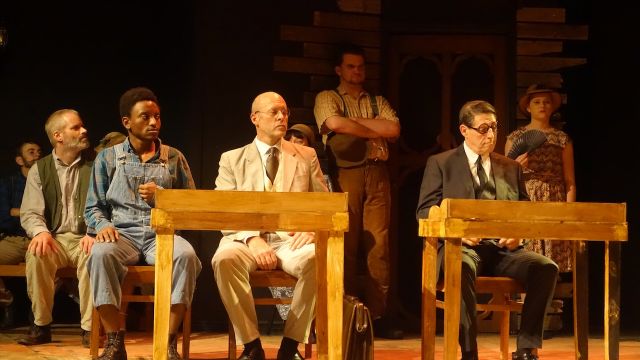To Kill A Mockingbird
Harper Lee’s novel To Kill A Mockingbird, held up by the early Civil Rights Movement as an excellent example of solidarity and non-violence, continues to resonate with readers and theatre audiences over 60 years after its publication, especially in the light of the #Blacklivesmatter movement. Difficult to stage in Perth, because of the demographics of our acting community, it is great to see Christopher Sergel’s moving theatrical adaption finally hit our stages.
Depression era Maycomb, Alabama is nicely recreated with laconic Southern American accents, appropriate to the era costumes by Danica Skziela and Nicole Miller, and a rotating set designed by Jane Sherwood and Ian Wilson that shows a suburban street, then rotates to reveal the Maycomb courthouse. Lighting design by John Woolrych is highly evocative, from the opening silhouette through to creating the oppressive heat of the courthouse. Appropriate and supportive sound design was provided by Vanessa Gudgeon.

Young actress Jennifer Wright plays the central role of Jean Louise (Scout) Finch. This is a demanding role, and one that is conventionally played by an adult actress, due to its complexity and depth. Jennifer handles the role with expertise, great layers and tenderness, and while she is a little older than the character she plays, Jennifer’s youth adds a beautiful naivety that would be difficult to achieve with an older actress. A beautiful performance. She shows a wonderful relationship with Justin Markham as Atticus Finch. An impressive performance from Markham, in probably his biggest and most complex role to date.
Sean Smith is very strong as Scout’s brother Jem - with a lovely depth of emotion, while eleven-year-old Luke Williams makes a welcome stage debut as their friend Dill. Both these roles are also usually played by adults, and the boys play them very well.

Another theatrical debut is made by Josephine Wayling, playing neighbour Maudie Atkinson - who also comments on and narrates the action. Far from being just an expositionary device, this is a very nicely rounded performance.
The role of Tom Robinson, a black man accused of a crime which he did not commit, is a very difficult one, as we only meet this pivotal character during his court performance. Kundai Walter Gotore makes this man a fully fleshed, relatable and believable young man, with whom we cannot help but sympathise.

There are a large number of small but vital roles in this show, and the cast have worked hard to give them relevance and credence. Among these, Ellie Cutbush is a warm but firm Calpurnia, Ron Arthurs gives authority and brings excellent non verbals to Judge Taylor, Julie Holmshaw and Pauline Gibb give solid, well characterised, performances as opinionated neighbours and Paul Cook, who is a lawyer when not acting, presumably draws on real life experience as hostile witness Bob Ewell. A number in this hard-working and focused supporting cast are also appearing on stage for the first time, including Siobhan Fowler as a conflicted Mayella Ewell, and Mark Dyer as the mysterious Boo Radley.
While To Kill A Mockingbird would never be described as “enjoyable”, this is a moving and poignant production than engages and moves its audience. Congratulations to all involved.
Kimberley Shaw

Subscribe to our E-Newsletter, buy our latest print edition or find a Performing Arts book at Book Nook.

